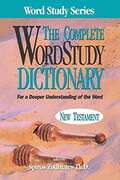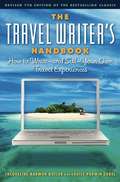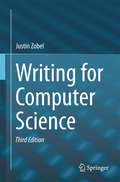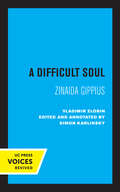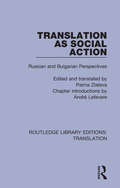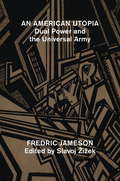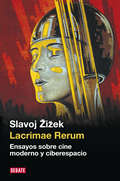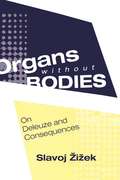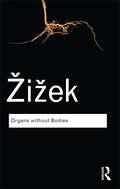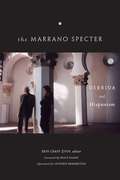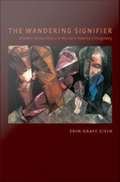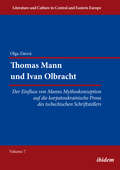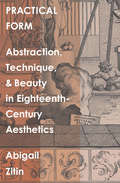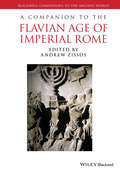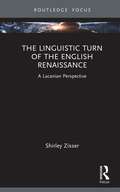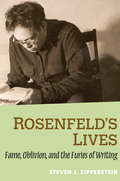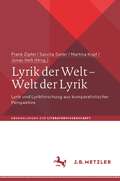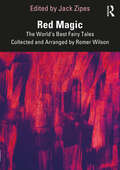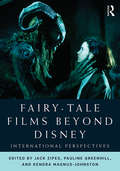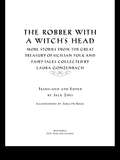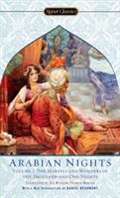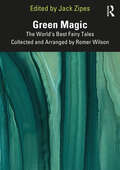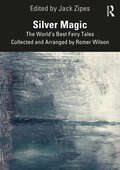- Table View
- List View
The Complete Word Study Dictionary New Testament (Word Study Ser.)
by Spiros ZodhiatesEvery word in the Greek New Testament is explained in great detail, covering all context usages for these words. Numbered to Strong's numbering system, each word has a basic definition and further commentary is provided by Dr. Spiros Zodhiates, noted Greek scholar. A companion Scripture Reference Index is provided for further
The Travel Writer's Handbook
by Louise Purwin Zobel Jacqueline Harmon ButlerVeteran travel writer Jacqueline Harmon Butler shows readers, one step at a time, how to research, write, and sell travel articles--but most importantly, she details what makes a travel article a winner.In this new edition, Butler updates her bestselling handbook for the 21st century with helpful tips on conducting Internet research, utilizing new advancements in digital photography and finding helpful applications on mobile phones. She also helps aspiring writers navigate the changing world of publishing by exploring blogging, new travel websites, and social media, all while discussing how best to expand your platform.She includes a brand new introduction to reflect the current state of the travel industry and the change in editors' needs. Butler covers all the nuts and bolts aspects of travel writing from pre-trip research, specific marketing strategies, and even includes 12 formats for travel articles with sure-fire appeal to editors and readers. She gives insightful and often humorous advice on pre- and post-trip topics like: How to target your market before you begin How to save time by doing background research before you leave How to write queries and get assignments in advance How to find new angles for overworked subjects What to take along--from video equipment and laptops to travel documents How to set up and conduct successful interviews How to take advantage of freebies and junkets without "selling out" How to sell what you write--and then sell it again
Writing for Computer Science
by Justin ZobelAll researchers need to write or speak about their work, and to have research that is worth presenting. Based on the author's decades of experience as a researcher and advisor, this third edition provides detailed guidance on writing and presentations and a comprehensive introduction to research methods, the how-to of being a successful scientist. Topics include: · Development of ideas into research questions; · How to find, read, evaluate and referee other research; · Design and evaluation of experiments and appropriate use of statistics; · Ethics, the principles of science and examples of science gone wrong. Much of the book is a step-by-step guide to effective communication, with advice on: · Writing style and editing; · Figures, graphs and tables; · Mathematics and algorithms; · Literature reviews and referees' reports; · Structuring of arguments and results into papers and theses; · Writing of other professional documents; · Presentation of talks and posters. Written in an accessible style and including handy checklists and exercises, Writing for Computer Science is not only an introduction to the doing and describing of research, but is a valuable reference for working scientists in the computing and mathematical sciences.
A Difficult Soul: Zinaida Gippius
by Vladimir Zlobinguide the Symbolist movement which dominated Russian literature for the first third of the twentieth century. A major poet, important playwright, and influential literary critic, she was also a sexual rebel who rejected traditional male/female roles as early as the 1890s. Vladimir Zlobin, her secretary and factotum from the time of her emigration to Paris after the revolution until her death in 1945, exposes the consequential inner workings of the literary circle around Gippius. His account of her three most important personal involvements--with her husband, the novelist and critic Dmitry Merezhkovsky; with the unattainable love of her life, the critic Dmitry Filosofov; and with the Devil, with whom she believed herself in personal contact--facilitates the task of understanding this truly "difficult soul." Himself a poet, Zlobin also offeres a detailed commentary on her poetry, and persuasively connects it to her personal and mystical experiences. In Karlinsky's perceptive introduction, Gippius emerges not only as one of the principals in the Modernist renascence of Russian poetry between 1890 and 1930, but as a figure of considerable historical interest, whose views, life, and work stand in significant relation to the major social, sexual, religious, and political currents of her time. This title is part of UC Press's Voices Revived program, which commemorates University of California Press's mission to seek out and cultivate the brightest minds and give them voice, reach, and impact. Drawing on a backlist dating to 1893, Voices Revived makes high-quality, peer-reviewed scholarship accessible once again using print-on-demand technology. This title was originally published in 1980.
Translation as Social Action: Russian and Bulgarian Perspectives (Routledge Library Editions: Translation #3)
by Palma Zlateva André LefevereOriginally published in 1993, Translation as Social Action is a varied collection of essays, which addresses translation as social action as its central theme, the book proposes a model of the translator as an agent in his or her own right. Translation is seen not just as a transfer of meanings from one language to another, but rather as an arena in which different cultures meet in the person of the translator. This perspective provides a complete contrast to Western translation studies, concerned with whether or not translation is really possible. Together the essays reveal a distinct tradition grappling with the most important topics in translation studies in ways that are different and challenging. The collection is essential reading for translation studies, as well as providing an interesting perspective on comparative literature and Eastern European studies.
Translation as Social Action: Russian and Bulgarian Perspectives
by Palma ZlatevaThe view of translation as a social, cultural, and creative activity has dominated Russian and Bulgarian practice. Now this varied collection of essays make this tradition accessible to students in the West. Taking translation as social action as its central theme, the book proposes a model of the translator as an agent in his or her own right. Translation is seen not just as a transfer of meanings from one language to another, but rather as an arena in which different cultures meet in the person of the translator. This perspective provides a complete contrast to Western translation studies, concerned with whether or not translation is really possible. Together the essays reveal a distinct tradition grappling with the most important topics in translation studies in ways that are different and challenging. The collection is essential reading for translation studies, as well as providing an interesting perspective on comparative literature and Eastern European studies.
An American Utopia: Dual Power and the Universal Army
by Slavoj Zizek Fredric JamesonControversial manifesto by acclaimed cultural theorist debated by leading writers Fredric Jameson's pathbreaking essay "An American Utopia" radically questions standard leftist notions of what constitutes an emancipated society. Advocated here are--among other things--universal conscription, the full acknowledgment of envy and resentment as a fundamental challenge to any communist society, and the acceptance that the division between work and leisure cannot be overcome. To create a new world, we must first change the way we envision the world. Jameson's text is ideally placed to trigger a debate on the alternatives to global capitalism. In addition to Jameson's essay, the volume includes responses from philosophers and political and cultural analysts, as well as an epilogue from Jameson himself. Many will be appalled at what they will encounter in these pages--there will be blood! But perhaps one has to spill such (ideological) blood to give the Left a chance. Contributing are Kim Stanley Robinson, Jodi Dean, Saroj Giri, Agon Hamza, Kojin Karatani, Frank Ruda, Alberto Toscano, Kathi Weeks, and Slavoj i ek.From the Trade Paperback edition.
Lacrimae rerum: Ensayos sobre cine y ciberespacio
by Slavoj ZizekConsiderado el «séptimo arte», el cine ha sido y sigue siendo uno de los medios de comunicación de masas más importantes. <P><P>Desde la primera función en el sótano del Grand Café des Capucines de París hace algo más de cien años, hasta las grandes superproducciones de Hollywood que dominan las pantallas del mundo, el cine ha sido técnica e industria, entretenimiento y vehículo de expresión de ideas y sentimientos. <P><P>Partiendo de estas consideraciones y estudiando la labor de reconocidos directores, el filósofo y psicoanalista Slavoj Zizek, profundo conocedor del universo cinematográfico y de la influencia de los medios de comunicación en la sociedad contemporánea, reflexiona sobre los temas principales de estos maestros y sus motivaciones a la hora de situarse detrás de la cámara. <P><P>De la imposibilidad de hacer remakes de las películas de Alfred Hitchcock al pesimismo en la obra de Krzysztof Kieslowski; de la imagen de la mujer, la irracionalidad y la angustia en los trabajos de Andrei Tarkovski y David Lynch a la posibilidad imaginaria o real de desplazarse a través del tiempo y el espacio como los personajes de Matrix, Zizek desarrolla su imaginación crítica y su agudo sentido literario para atrapar al lector con imágenes, ideas y revelaciones que sorprenderán no solo a los buenos aficionados al cine, sino también a todos aquellos que deseen acercarse a los clásicos de la pantalla de la mano de este original y provocador filósofo.
Organs without Bodies: Deleuze and Consequences
by Slavoj ZizekFirst published in 2004. Routledge is an imprint of Taylor & Francis, an informa company.
Organs without Bodies: On Deleuze and Consequences (Routledge Classics)
by Slavoj ZizekWith a new introduction by the author In this deliciously polemical work, a giant of cultural theory immerses himself in the ideas of a giant of French thought. In his inimical style, Zizek links Deleuze's work with both Oedipus and Hegel, figures from whom the French philosopher distanced himself. Zizek turns some Deleuzian concepts around in order to explore the 'organs without bodies' in such films as Fight Club and the works of Hitchcock. Finally, he attacks what he sees as the 'radical chic' Deleuzians, arguing that such projects turn Deleuze into an ideologist of today's 'digital capitalism'. With his brilliant energy and fearless argumentation, Zizek sets out to restore a truer, more radical Deleuze than the one we thought we knew.
The Marrano Specter: Derrida and Hispanism
by Erin Graff Zivin Peggy Kamuf Geoffrey Bennington Patrick Dove Jaime Hanneken David Kelman Brett Levinson Jacques Lezra Alberto Moreiras Gareth WilliamsThe Marrano Specter pursues the reciprocal influence between Jacques Derrida and Hispanism. On the one hand, Derrida’s work has engendered a robust conversation among philosophers and critics in Spain and Latin America, where his work circulates in excellent translation, and where many of the terms and problems he addresses take on a distinctive meaning: nationalism and cosmopolitanism; spectrality and hauntology; the relation of subjectivity and truth; the university; disciplinarity; institutionality.Perhaps more remarkably, the influence is in a profound sense reciprocal: across his writings, Derrida grapples with the theme of marranismo, the phenomenon of Sephardic crypto-Judaism. Derrida’s marranismo is a means of taking apart traditional accounts of identity; a way for Derrida to reflect on the status of the secret; a philosophical nexus where language, nationalism, and truth-telling meet and clash in productive ways; and a way of elaborating a critique of modern biopolitics. It is much more than a simple marker of his work’s Hispanic identity, but it is also, and irreducibly, that.The essays collected in The Marrano Specter cut across the grain of traditional Hispanism, but also of the humanistic disciplines broadly conceived. Their vantage point—the theoretical, philosophically inflected critique of disciplinary practices—poses uncomfortable, often unfamiliar questions for both hispanophone studies and the broader theoretical humanities.
The Wandering Signifier: Rhetoric of Jewishness in the Latin American Imaginary
by Erin Graff ZivinWhile Jews figure in the work of many modern Latin American writers, the questions of how and to what end they are represented have received remarkably little critical attention. Helping to correct this imbalance, Erin Graff Zivin traces the symbolic presence of Jews and Jewishness in late-nineteenth- through late-twentieth-century literary works from Argentina, Brazil, Peru, Mexico, Colombia, and Nicaragua. Ultimately, Graff Zivin's investigation of representations of Jewishness reveals a broader, more complex anxiety surrounding difference in modern Latin American culture. In her readings of Spanish American and Brazilian fiction, Graff Zivin highlights inventions of Jewishness in which the concept is constructed as a rhetorical device. She argues that Jewishness functions as a wandering signifier that while not wholly empty, can be infused with meaning based on the demands of the textual project in question. Just as Jews in Latin America possess distinct histories relative to their European and North American counterparts, they also occupy different symbolic spaces in the cultural landscape. Graff Zivin suggests that in Latin American fiction, anxiety, desire, paranoia, attraction, and repulsion toward Jewishness are always either in tension with or representative of larger attitudes toward otherness, whether racial, sexual, religious, national, economic, or metaphysical. She concludes The Wandering Signifier with an inquiry into whether it is possible to ethically represent the other within the literary text, or whether the act of representation necessarily involves the objectification of the other.
Thomas Mann und Ivan Olbracht [German-language Edition]: Der Einfluss von Manns Mythoskonzeption auf die karpatoukrainische Prosa des tschechischen Schriftstellers (Literature and Culture in Central and Eastern Europe #7)
by Olga ZitováZitovás literary analysis starts at the interface of Czech and German literature in the first half of the twentieth century. Thomas Mann's novel Joseph and His Brothers is set in comparative relation to Ivan Olbracht's prose texts Nikola Šuhaj loupe ník and Golet v údolí. Olbracht translated three volumes of Mann's Joseph's tetralogy parallel to the composition of his own prose works. Zitová examines the influence of Olbracht's translation work on his own work. Zitovás literaturwissenschaftliche Analyse setzt an einer Schnittstelle der tschechischen und deutschen Literatur in der ersten Hälfte des zwanzigsten Jahrhunderts an. Thomas Manns Roman Joseph und seine Brüder wird vergleichend in Beziehung gesetzt zu Ivan Olbrachts in den dreißiger Jahren entstandenen Prosatexten Nikola Šuhaj loupe ník und Golet v údolí. Olbracht übersetzte parallel zur Abfassung seiner Prosawerke insgesamt drei Bände aus Manns umfangreicher Josephs-Tetralogie. Diese Übersetzertätigkeit blieb, wie Zitová aufzeigt, nicht ohne Einfluss auf sein eigenes Schaffen. Das Buch knüpft an eine von Jirí Opelík geschriebene Studie Olbrachts reife Schaffensperiode sub specie seiner Übersetzungen aus Thomas Mann und Lion Feuchtwanger (1967) an, in der dieser tschechische Literaturwissenschaftler das Thema eröffnete. Mit Zitovás Tiefenanalyse schließt sich diese germanobohemistische Forschungslücke.
Practical Form: Abstraction, Technique, and Beauty in Eighteenth-Century Aesthetics (The Lewis Walpole Series in Eighteenth-Century Culture and History)
by Abigail ZitinA groundbreaking study of the development of form in eighteenth-century aesthetics In this original work, Abigail Zitin proposes a new history of the development of form as a concept in and for aesthetics. Her account substitutes women and artisans for the proverbial man of taste, asserting them as central figures in the rise of aesthetics as a field of philosophical inquiry in eighteenth-century Europe. She shows how the idea of formal abstraction so central to conceptions of beauty in this period emerges from the way practitioners think about craft and skill across the domestic, industrial, and so-called high arts. Zitin elegantly maps the complex connections among aesthetics, form, and formalism, drawing out the understated presence of practice in the writings of major eighteenth-century thinkers including Locke, Addison, Burke, and Kant. This new take on an old story ultimately challenges readers to reconsider form and why it matters.
A Companion to the Flavian Age of Imperial Rome (Blackwell Companions to the Ancient World)
by Andrew ZissosA Companion to the Flavian Age of Imperial Rome provides a systematic and comprehensive examination of the political, economic, social, and cultural nuances of the Flavian Age (69–96 CE). Includes contributions from over two dozen Classical Studies scholars organized into six thematic sections Illustrates how economic, social, and cultural forces interacted to create a variety of social worlds within a composite Roman empire Concludes with a series of appendices that provide detailed chronological and demographic information and an extensive glossary of terms Examines the Flavian Age more broadly and inclusively than ever before incorporating coverage of often neglected groups, such as women and non-Romans within the Empire
The Linguistic Turn of the English Renaissance: A Lacanian Perspective (Routledge Focus on Mental Health)
by Shirley ZisserThe Linguistic Turn of the English Renaissance: A Lacanian Perspective examines a selection of cultural phenomena of the English Renaissance, all of which include a focus on language, from a Lacanian perspective. The book examines four inter-related cultural symptoms of the English Renaissance: the paucity of painting, the interest in rhetoric, the emergence of a literary style focusing on form and a fascination with the myth of Orpheus. The book argues that the English Renaissance, an apex of rhetorical theory, can offer psychoanalysis further knowledge concerning the intrication of language and flesh, especially where feminine jouissance is at stake. These language-centred phenomena emerge against the backdrop of a peculiar configuration of the visual field, which in contrast to other cultures of the European Renaissance is largely barren of painting other than portraiture. The book will be of interest to psychoanalysts, scholars of Renaissance culture and those interested in the psychoanalytic study of culture.
Environmental Practice and Early American Literature
by Michael ZiserThis original and provocative study tells the story of American literary history from the perspective of its environmental context. Weaving together close readings of early American texts with ecological histories of tobacco, potatoes, apples, and honey bees, Michael Ziser presents a method for literary criticism that explodes the conceptual distinction between the civilized and natural world. Beginning with the English exploration of Virginia in the sixteenth century, Ziser argues that the settlement of the "New World" - and the cultivation and exploitation of its bounty - dramatically altered how writers used language to describe the phenomena they encountered on the frontier. Examining the work of Harriot, Grainger, Cooper, Thoreau and others, Ziser reveals how these authors, whether consciously or not, transcribed the vibrant ecology of North America, and the ways that the environment helped codify a uniquely American literary aesthetic of lasting importance.
Rosenfeld's Lives: Fame, Oblivion, and the Furies of Writing
by Steven J. ZippersteinBorn in Chicago in 1918, the prodigiously gifted and erudite Isaac Rosenfeld was anointed a "genius" upon the publication of his "luminescent" novel, Passage from Home and was expected to surpass even his closest friend and rival, Saul Bellow. Yet when felled by a heart attack at the age of thirty-eight, Rosenfeld had published relatively little, his life reduced to a metaphor for literary failure. In this deeply contemplative book, Steven J. Zipperstein seeks to reclaim Rosenfeld's legacy by "opening up" his work. Zipperstein examines for the first time the "small mountain" of unfinished manuscripts the writer left behind, as well as his fiercely candid journals and letters. In the process, Zipperstein unearths a turbulent life that was obsessively grounded in a profound commitment to the ideals of the writing life. Rosenfeld's Lives is a fascinating exploration of literary genius and aspiration and the paradoxical power of literature to elevate and to enslave. It illuminates the cultural and political tensions of post-war America, Jewish intellectual life of the era, and--most poignantly--the struggle at the heart of any writer's life.
Lyrik der Welt – Welt der Lyrik: Lyrik und Lyrikforschung aus komparatistischer Perspektive (Abhandlungen zur Literaturwissenschaft)
by Frank Zipfel Sascha Seiler Martina Kopf Jonas HeßLyrik und Lyriktheorie wurden in der Komparatistik oft vernachlässigt. Aufgrund der besonderen Sprachgebundenheit von Lyrik ist es zwar nicht selbstverständlich, sie aus einer transnationalen, sprachübergreifenden Perspektive zu untersuchen, allerdings bleiben dann wichtige Aspekte der internationalen zeitgenössischen Lyrikproduktion und der Lyriktradition unerkannt und unerforscht. Dieser Sammelband liefert einen Beitrag zur Schließung dieser Lücke, indem er das komplexe Verhältnis zwischen „Lyrik“ und „Welt“ aus komparatistischer Perspektive untersucht und reflektiert. In der Nachfolge von Konzepten wie Goethes Weltpoesie, Ezra Pounds world poetry oder Enzensbergers poetischer Weltsprache, wird die Internationalität der Lyrik in ihrer Verbindung mit verschiedenen ‚Welten‘ beleuchtet: ihr Bezug zur Lebenswelt, ihr Stellung in der Medienwelt, ihre Erforschung in der Wissenschaftswelt.
Red Magic: The World’s Best Fairy Tales Collected and Arranged by Romer Wilson
by Jack Zipes Kay NielsenWith a Preface and biographies from Jack Zipes, as well as the original illustrations by Kay Nielsen, this collection of fairy tales originally published by the award-winning Romer Wilson – Green Magic (1928), Silver Magic (1929), and Red Magic (1930) – offers a combination of classic fairy tales, alongside lesser known, global and diverse tales. Red Magic contains such classics as “Aladdin and the Wonderful Lamp” from the Arabian Nights, “A Child’s Dream on a Star” by Dickens, and “The Chimera” by Hawthorne. It also contains previously unpublished tales such as “Princess Silver Silk” and “The Enchanted Deer.” It was Romer Wilson’s intention to combine the familiar with the unknown, and to introduce authors and cultures from a variety of countries. As a researcher, Wilson uncovered a remarkable amount of stories from other countries that remain unknown today. This collection gives voice to unique and intriguing tales that inspire children to have a better understanding of how people and their stories are alike despite major differences. Through his Preface and commentary, Jack Zipes shows how all three books are a means to bring people together in the name of peace and justice. These books will, therefore, be of interest to anyone researching or studying fairy tales, folklore and children’s literature, as well as global or comparative literature and social justice.
Fairy-Tale Films Beyond Disney: International Perspectives
by Jack Zipes Pauline Greenhill Kendra Magnus-JohnstonThe fairy tale has become one of the dominant cultural forms and genres internationally, thanks in large part to its many manifestations on screen. Yet the history and relevance of the fairy-tale film have largely been neglected. In this follow-up to Jack Zipes’s award-winning book The Enchanted Screen (2011), Fairy-Tale Films Beyond Disney offers the first book-length multinational, multidisciplinary exploration of fairy-tale cinema. Bringing together twenty-three of the world’s top fairy-tale scholars to analyze the enormous scope of these films, Zipes and colleagues Pauline Greenhill and Kendra Magnus-Johnston present perspectives on film from every part of the globe, from Hayao Miyazaki’s Spirited Away, to Jan Švankmajer’s Alice, to the transnational adaptations of 1001 Nights and Hans Christian Andersen. Contributors explore filmic traditions in each area not only from their different cultural backgrounds, but from a range of academic fields, including criminal justice studies, education, film studies, folkloristics, gender studies, and literary studies. Fairy-Tale Films Beyond Disney offers readers an opportunity to explore the intersections, disparities, historical and national contexts of its subject, and to further appreciate what has become an undeniably global phenomenon.
The Robber with a Witch's Head: More Stories from the Great Treasury of Sicilian Folk and Fairy Tales Collected by Laura Gonzenbach
by Jack Zipes Laura GonzenbachThe Robber with the Witch's Head presents almost fifty new stories about demons and clever maidens and princes. Bursting with life, this is a storyteller's dream, full of adventure and magic, translated by Jack Zipes.
Arabian Nights: The Marvels and Wonders of the Thousand and One Nights
by Jack Zipes Sir Richard Francis BurtonAfter King Shahryar had his wife killed for cheating, he began to corrupt--then kill--one virgin a night, as revenge on womankind. Then he meets Scheherazade, who, night after night, saves her own life by telling him fantastical tales of genies, wishes, terror, and passion. Famous stories from here are Aladdin and His Magic Lamp, Ali Baba and the Forty Thieves, and others. Frequent telling of sexual activities through analogy. There is a glossary at the end, which would be helpful to read before beginning. The original (supposedly) 30 volumes were later whittled down to 10 volumes, and now to one volume of the major stories and other of lesser stories.
Green Magic: The World’s Best Fairy Tales Collected and Arranged by Romer Wilson
by Jack Zipes Violet BruntonWith a Preface and biographies from Jack Zipes, as well as the original illustrations by Violet Brunton, this collection of fairy tales originally published by the award-winning Romer Wilson – Green Magic (1928), Silver Magic (1929), and Red Magic (1930) – offers a combination of classic fairy tales, alongside lesser-known, global and diverse tales. Green Magic contains many traditional fairy tales, including “Rapunzel” by Grimm, “Ali Baba” by Diyab and Galland, and “Puss in Boots” by Perrault, as well as previously unknown tales, such as “The Golden Twins” by Iperescu and “The Brotherless Girl” by an anonymous author. It was Romer Wilson’s intention to combine the familiar with the unknown, and introduce authors and cultures from a variety of countries. As a researcher, she uncovered a remarkable amount of stories from other countries that remain unknown today. The collection gives voice to unique and intriguing tales that inspire children to have a better understanding of how people and their stories are alike despite major differences. Through his Preface and commentary, Jack Zipes shows how all three books are a means to bring people together in the name of peace and justice. These books will therefore be of interest to anyone researching or studying fairy tales, folklore, and children’s literature, as well as global or comparative literature and social justice.
Silver Magic: The World’s Best Fairy Tales Collected and Arranged by Romer Wilson
by Jack Zipes Violet BruntonWith a Preface and biographies from Jack Zipes, as well as the original illustrations by Violet Brunton, this collection of fairy tales originally published by the award-winning Romer Wilson – Green Magic (1928), Silver Magic (1929), and Red Magic (1930) – offers a combination of classic fairy tales, alongside lesser known, global and diverse tales. Silver Magic contains classic fairy tales including “Cinderella,” “Beauty and the Beast,” and Hawthorne’s “The Miraculous Pitcher,” as well as several anonymous and previously undiscovered tales such as “Lohengrin.” It was Romer Wilson’s intention to combine the familiar with the unknown, and to introduce authors and cultures from a variety of countries. As a researcher, Wilson uncovered a remarkable amount of stories from other countries that remain unknown today. This collection gives voice to unique and intriguing tales that inspire children to have a better understanding of how people and their stories are alike despite major differences. Through his Preface and commentary, Jack Zipes shows how all three books are a means to bring people together in the name of peace and justice. These books will, therefore, be of interest to anyone researching or studying fairy tales, folklore and children’s literature, as well as global or comparative literature and social justice.
